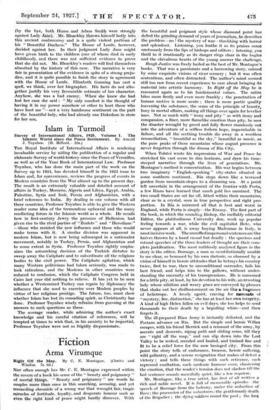Islam in Turmoil
Survey of International Affairs, 1925. Volume I. The Islamic World since the Peace Settlement. By Arnold J. Toynbee. (H. Milford. • 26s.) THE Royal Institute of International Affairs is rendering invaluable service by aiding the publication of a regular and elaborate Survey of world-history since the Peace of Versailles, as well as of the Year Book of International Law: Professor Toynbee, who has done the main part of the work on the Survey up to 1924, has devoted himself in the 1925 issue to Islam and, for convenience, reviews the progress of events in Moslem countries from the War ahnost up to the present day. The result is an extremely valuable and detailed account of affairs in Turkey, Moroceo; Algeria and Libya, Egypt, Arabia, Palestine, Syria and Irak, Persia and Afghanistan, with a brief reference to India. By dealing in one volume with all these countries, Professor Toynbee is able to, give the Western reader some idea of the tremendous upheaval and the many conflicting forces in the Islamic world as a whole. He recalls how in first-century Jewry the pressure of Hellenism had given rise to the rival parties of Zealots " and " Herodians " —those who resisted the new influence and those who would make terms with it. A similar division was apparent in modern Islam, but is now being submerged in a nationalist movement, notably in Turkey, Persia, and Afghanistan and to some extent in Syria. Professor Toynbee rightly empha- sizes the astonishing decision of the Turkish dictator to sweep away the Caliphate and to subordinate all the religious bodies to the civil power. The Caliphate agitation, which many Western politicians had taken seriously, was made to look ridiculous, and the Moslems in other countries were reduced to confusion, which the Caliphate Congress held in Cairo last year did nothing to relieve. It has yet to be seen whether a Westernized Turkey can regain by diplomacy the influence that she used to exercise' over Moslem peoples by virtue of her religious prestige. The future, too, must show whether Islam has lost its crusading spirit, as Christianity has done. Professor Toynbee wisely refrains from guessing at the answers to such questions as these.
The average reader, while admiring the author's exact knowledge and his careful citation of references; will be tempted at times to wish that, in his anxiety _to be impartial, Professor Toynbee were not so frigidly dispassionate.










































 Previous page
Previous page